Unit 8 Adventure lesson 3 Marco Polo课件(共34张PPT)
文档属性
| 名称 | Unit 8 Adventure lesson 3 Marco Polo课件(共34张PPT) | 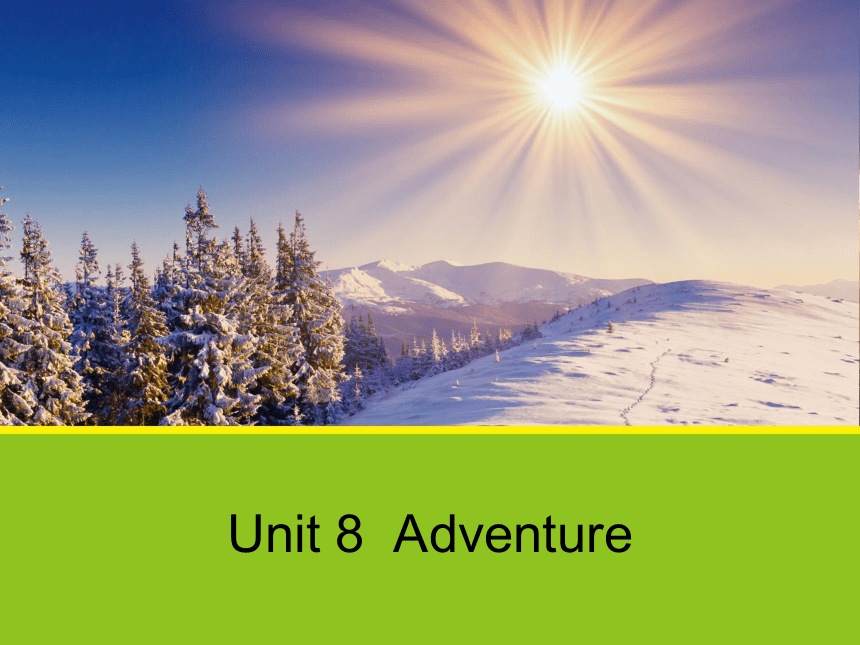 | |
| 格式 | zip | ||
| 文件大小 | 1.7MB | ||
| 资源类型 | 教案 | ||
| 版本资源 | 北师大版 | ||
| 科目 | 英语 | ||
| 更新时间 | 2018-11-24 17:02:26 | ||
图片预览

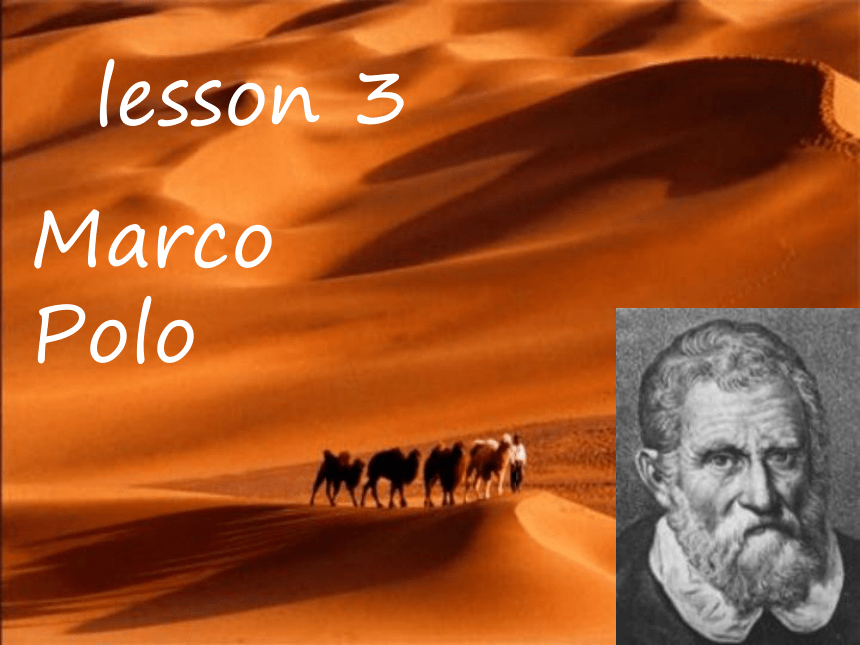
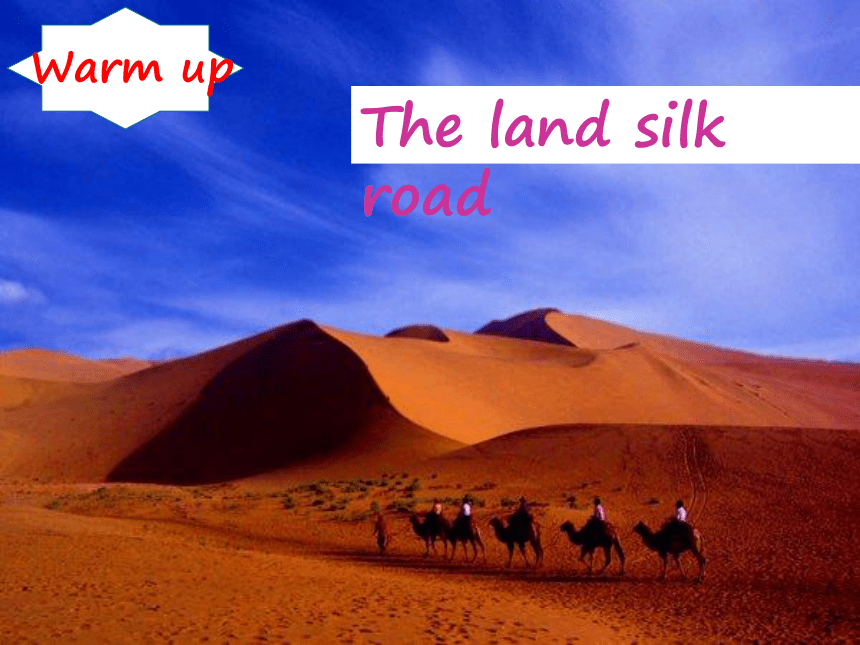
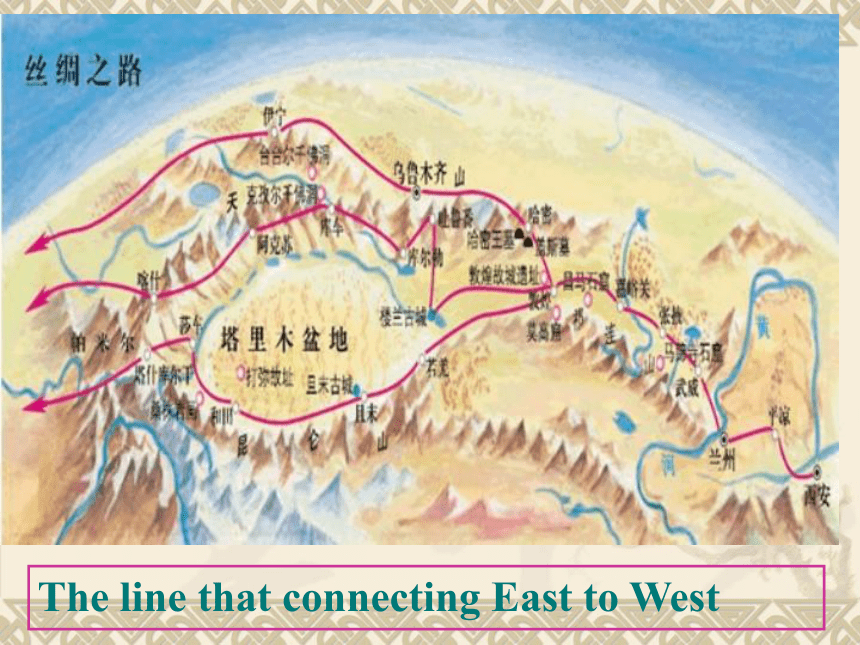
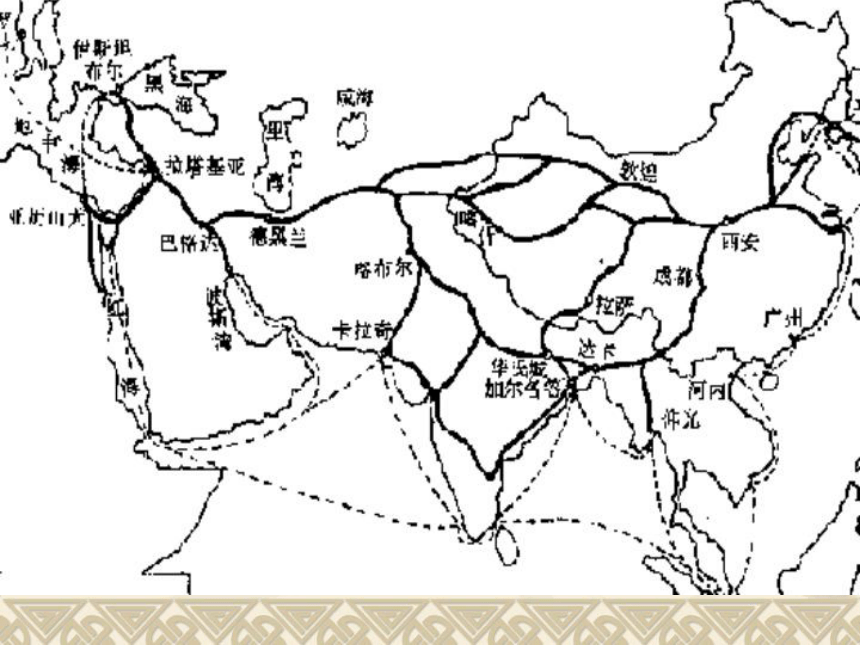

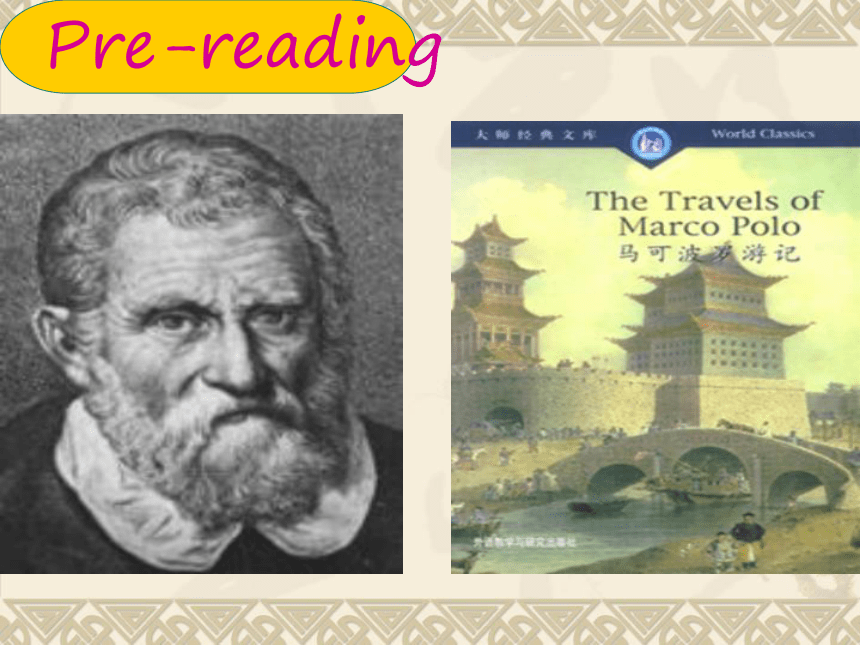
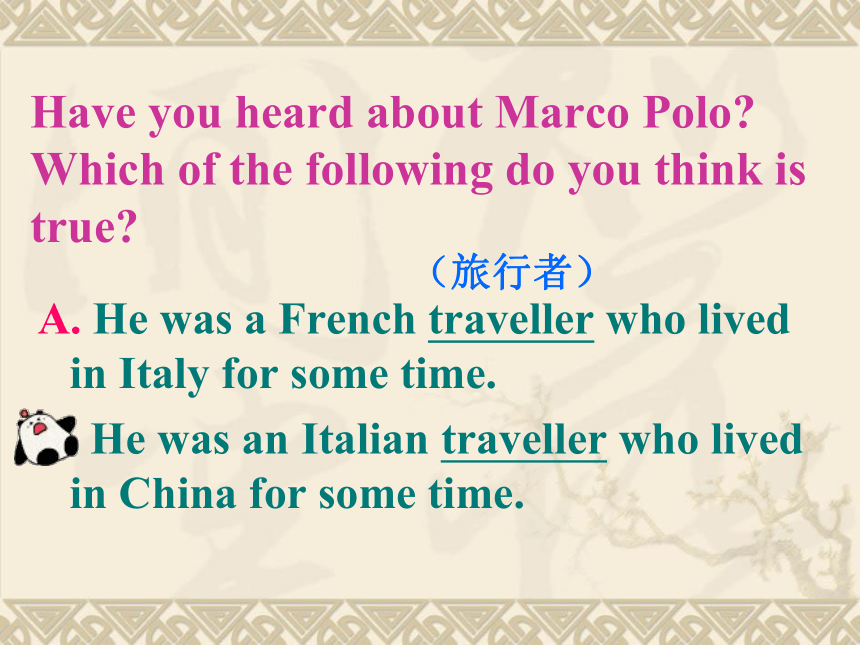
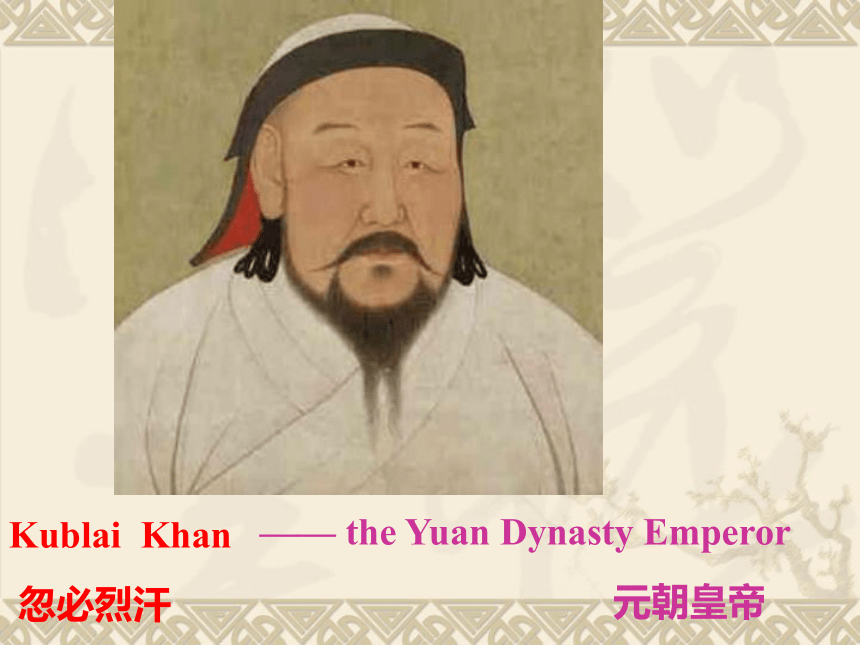
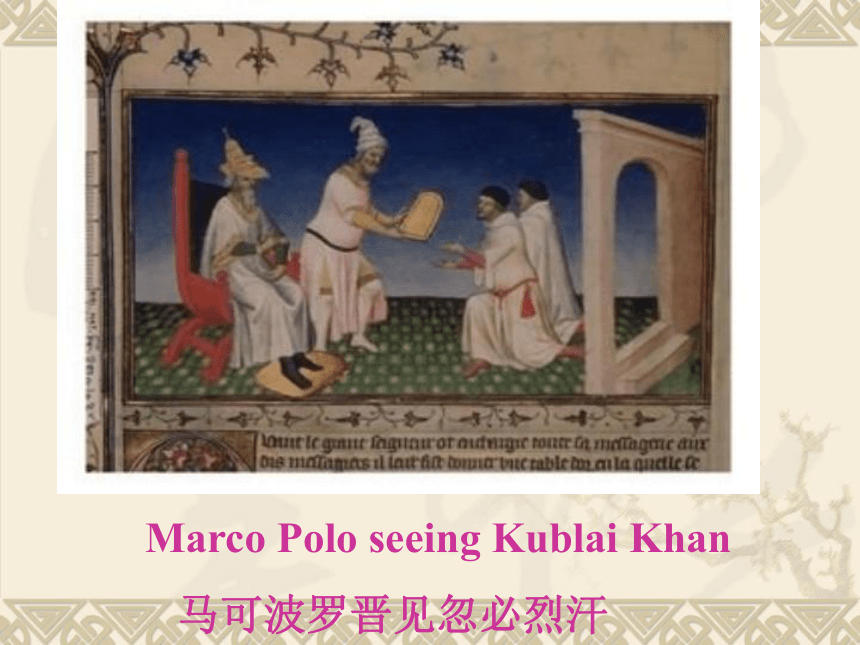
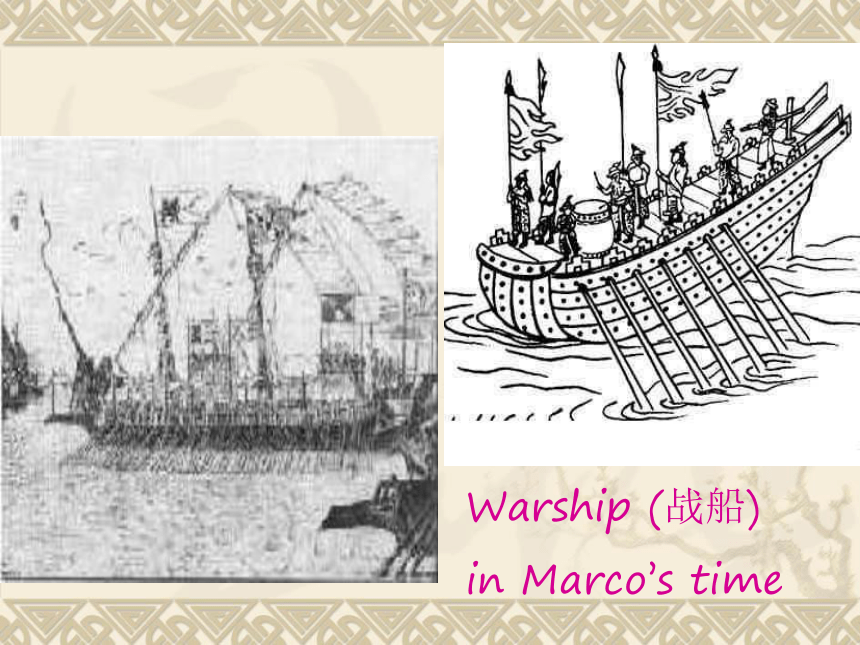
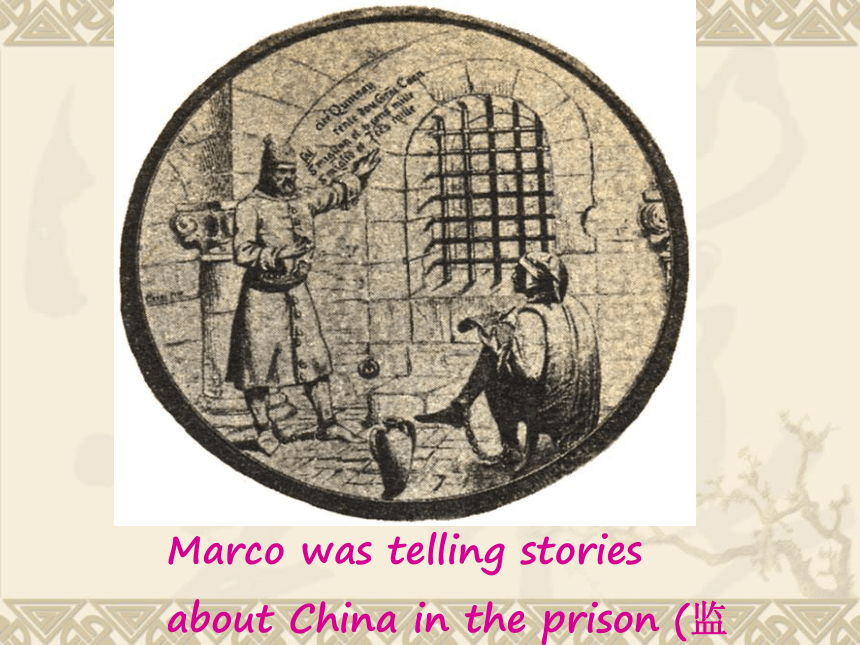
文档简介
课件34张PPT。Unit 8 Adventure lesson 3
Marco PoloThe land silk roadWarm upThe line that connecting East to WestSeeing the picture, what things will you think about?When talking about the silk road, who will occur into your mind?Pre-reading Have you heard about Marco Polo? Which of the following do you think is true?A. He was a French traveller who lived in Italy for some time.
B. He was an Italian traveller who lived in China for some time.(旅行者)Kublai Khan
忽必烈汗—— the Yuan Dynasty Emperor
元朝皇帝Marco Polo seeing Kublai Khan
马可波罗晋见忽必烈汗Warship (战船)
in Marco’s timeMarco was telling stories
about China in the prison (监狱).Books talked about Marco Polo in ChinaFast readingRead through the text quickly, and match the paragraphs with the main idea.Read through the text quickly, and find out the information about Marco Polo and fill out the following form.Second readingMarco Polo1254, Italy1271417 129170The Description of the WorldThe third reading Read the passage again and answer the following questions.How old was Marco when he travelled across Europe and Asia?
Why did Marco and his father travel to China?Questions:He was 17 years old at that time.Because they wanted to do trade
with the Chinese.Questions:Was Kublai Khan happy to
meet Marco and his father?
Why was the Emperor impressed by Marco?Yes, he was very happy to meet them.Because Marco was very clever and could already speak 4 languages, although he was young.Questions:How did Marco describe
the Summer Palace?
He described it as “ The greatest palace that ever was…”.The walls ?The Hall ?Questions:Why was Marco surprised to
see people using paper money?
What were the black stones Marco saw
people burning for fuel?Because in Europe, people paid for
goods with gold or silver.The black stones were coal.Complete the sentences using the words from exercise 3. He became _________ through hard work and careful saving.
2. He is a successful ________. He has already written three best selling novels.wealthyauthorin turn, wealthy, author,
break out, stand by3. The president told the reporter that he wanted to __________ his earlier statement.4. In the past, without clean running water, disease would often ___________ in cities .
5. The customer praised the manager, who, ___________ praised his staff.break outin turnstand byLanguage pointstrade (n) & (v) 贸易;商业(Para 1)
do ~ with sb. ; ~ with sb. 与某人做生意
e.g. Our country does trade with a lot of
European countries.
trade sth for sth.用某物交换某物
e.g. I traded information for money.
2. eventually (adv.) 最后,终于,结果(Para 1)
e.g. He worked very hard and eventually made himself ill.3. be happy (sorry/ sad…) to do sth.(Para2)
很高兴(抱歉/ 伤心)做某事
e.g. I am sorry to tell you this bad news.
4. serve (v) 服务;侍候;供应(Para2)
~ (sb.) as sth. 为(某人)工作;当某职
e.g. Tony serves (his boss) as a driver for many years.
~ sb. (sth.) with sth. 为某人(某物)提供某物
e.g. Lily likes to serve her guests with coffee.
The city is well served with public transport.6. amaze (vt.) 吃惊,使惊奇(Para3)
be amazed by 对(因)…大感惊讶
e.g. We were amazed by her sexy look.
be amazed to do… 很惊讶做某事
e.g. We were amazed to hear the news.
be amazed that 对…大感惊讶
e.g. I was amazed that he had made such rapid progress in English.
5. in turn 依此,替换地(Para3)
e.g. They sang on the stage in turn.7. describe…as 把---说成(Para 3)
describe sth. (sb. ) as + adj. ( n )
e.g. He described my plan as unrealistic.
他批评我的计划不切实际。
e.g. 他自称艺术家。
He describes himself as an artist.8. seat (n)座位;(v) 使坐下;容纳(Para 3) e.g. Please go back to your seat.
She seated herself on the sofa.
The hall is so large that it can seat 5000 people.9. be available (adj.) (Para 4)
可得到的;可用的;可看见的
e.g. Is the library available during summer vacation?
这个图书馆暑假开放吗?
The doctor is not available now.
医生现在没空。10. pay (vt.) 付款,支付(Para 4)
pay …for… 付…的款;受…报应
e.g. I paid $5 for that book.
I will make him pay for his rudeness!
我要他为自己的蛮横无礼尝尝苦头!
pay off 全部还清
e.g. I have paid off all my debts.11. confuse (vt.) 使人困惑,使弄错(Para 4)
e.g. The difficult question confused him.
be confused by … 对(因)…感到困惑
e.g. People were confused by a lot of
information.
人们被大量的信息搞糊涂了.12. tell sth. to sb. = tell sb. sth. (Para 5 )
告诉某人某事
e.g. I am going to tell you my secret.
I am going to tell my secret to you.13. stand by 忠于,坚守,坚持(Para 6)
e.g. I still stand by what I said yesterday.
I stand by my principles.
我坚持我昨天说的话。 我坚持我的原则。Have you taken down
all the language points?Fill in the blanks with “which”,“when”,“where”:1.This is the factory _______ we will visit.
2.This is the place _______ he was born in.
3. This is the place _______ he was born.
4. I remember the days_______ we spent.
5. This is the factory ______ we works.
6. This is the place _______ we live in .
7. This is the place _______ we live.
8. This is the time ______ he died.
whichwhichwherewhichwherewhichwherewhen
Marco PoloThe land silk roadWarm upThe line that connecting East to WestSeeing the picture, what things will you think about?When talking about the silk road, who will occur into your mind?Pre-reading Have you heard about Marco Polo? Which of the following do you think is true?A. He was a French traveller who lived in Italy for some time.
B. He was an Italian traveller who lived in China for some time.(旅行者)Kublai Khan
忽必烈汗—— the Yuan Dynasty Emperor
元朝皇帝Marco Polo seeing Kublai Khan
马可波罗晋见忽必烈汗Warship (战船)
in Marco’s timeMarco was telling stories
about China in the prison (监狱).Books talked about Marco Polo in ChinaFast readingRead through the text quickly, and match the paragraphs with the main idea.Read through the text quickly, and find out the information about Marco Polo and fill out the following form.Second readingMarco Polo1254, Italy1271417 129170The Description of the WorldThe third reading Read the passage again and answer the following questions.How old was Marco when he travelled across Europe and Asia?
Why did Marco and his father travel to China?Questions:He was 17 years old at that time.Because they wanted to do trade
with the Chinese.Questions:Was Kublai Khan happy to
meet Marco and his father?
Why was the Emperor impressed by Marco?Yes, he was very happy to meet them.Because Marco was very clever and could already speak 4 languages, although he was young.Questions:How did Marco describe
the Summer Palace?
He described it as “ The greatest palace that ever was…”.The walls ?The Hall ?Questions:Why was Marco surprised to
see people using paper money?
What were the black stones Marco saw
people burning for fuel?Because in Europe, people paid for
goods with gold or silver.The black stones were coal.Complete the sentences using the words from exercise 3. He became _________ through hard work and careful saving.
2. He is a successful ________. He has already written three best selling novels.wealthyauthorin turn, wealthy, author,
break out, stand by3. The president told the reporter that he wanted to __________ his earlier statement.4. In the past, without clean running water, disease would often ___________ in cities .
5. The customer praised the manager, who, ___________ praised his staff.break outin turnstand byLanguage pointstrade (n) & (v) 贸易;商业(Para 1)
do ~ with sb. ; ~ with sb. 与某人做生意
e.g. Our country does trade with a lot of
European countries.
trade sth for sth.用某物交换某物
e.g. I traded information for money.
2. eventually (adv.) 最后,终于,结果(Para 1)
e.g. He worked very hard and eventually made himself ill.3. be happy (sorry/ sad…) to do sth.(Para2)
很高兴(抱歉/ 伤心)做某事
e.g. I am sorry to tell you this bad news.
4. serve (v) 服务;侍候;供应(Para2)
~ (sb.) as sth. 为(某人)工作;当某职
e.g. Tony serves (his boss) as a driver for many years.
~ sb. (sth.) with sth. 为某人(某物)提供某物
e.g. Lily likes to serve her guests with coffee.
The city is well served with public transport.6. amaze (vt.) 吃惊,使惊奇(Para3)
be amazed by 对(因)…大感惊讶
e.g. We were amazed by her sexy look.
be amazed to do… 很惊讶做某事
e.g. We were amazed to hear the news.
be amazed that 对…大感惊讶
e.g. I was amazed that he had made such rapid progress in English.
5. in turn 依此,替换地(Para3)
e.g. They sang on the stage in turn.7. describe…as 把---说成(Para 3)
describe sth. (sb. ) as + adj. ( n )
e.g. He described my plan as unrealistic.
他批评我的计划不切实际。
e.g. 他自称艺术家。
He describes himself as an artist.8. seat (n)座位;(v) 使坐下;容纳(Para 3) e.g. Please go back to your seat.
She seated herself on the sofa.
The hall is so large that it can seat 5000 people.9. be available (adj.) (Para 4)
可得到的;可用的;可看见的
e.g. Is the library available during summer vacation?
这个图书馆暑假开放吗?
The doctor is not available now.
医生现在没空。10. pay (vt.) 付款,支付(Para 4)
pay …for… 付…的款;受…报应
e.g. I paid $5 for that book.
I will make him pay for his rudeness!
我要他为自己的蛮横无礼尝尝苦头!
pay off 全部还清
e.g. I have paid off all my debts.11. confuse (vt.) 使人困惑,使弄错(Para 4)
e.g. The difficult question confused him.
be confused by … 对(因)…感到困惑
e.g. People were confused by a lot of
information.
人们被大量的信息搞糊涂了.12. tell sth. to sb. = tell sb. sth. (Para 5 )
告诉某人某事
e.g. I am going to tell you my secret.
I am going to tell my secret to you.13. stand by 忠于,坚守,坚持(Para 6)
e.g. I still stand by what I said yesterday.
I stand by my principles.
我坚持我昨天说的话。 我坚持我的原则。Have you taken down
all the language points?Fill in the blanks with “which”,“when”,“where”:1.This is the factory _______ we will visit.
2.This is the place _______ he was born in.
3. This is the place _______ he was born.
4. I remember the days_______ we spent.
5. This is the factory ______ we works.
6. This is the place _______ we live in .
7. This is the place _______ we live.
8. This is the time ______ he died.
whichwhichwherewhichwherewhichwherewhen
